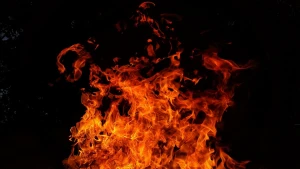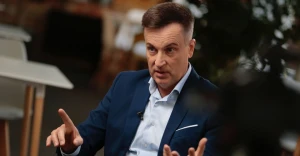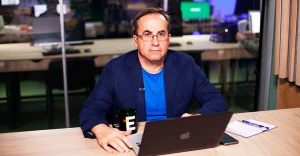
Yevhen Hulevych from Lviv: from intellectual projects to philosophy of trenches and death near Bakhmut
Researcher, intellectual, and philosopher from Lviv, Yevhen Hulevych stood up to defend Ukraine after Russia's full-scale invasion, serving in the 46th Brigade. On March 28, it became known that he was killed near Bakhmut
Espreso recalls the remarkable Lviv resident.
"During the war, a gigantic avalanche of things happens that sticks in the memory for no reason, that is, by itself, and at the same time, something that verifies personal, such different memories with a great tuning fork of joint attention. The avalanche of memory will gradually become a monotonous event, something that cannot be lost and forgotten. It is, of course, something more than a war with its curtains. Even from the same battle scene, two people will intensely remember different things. You have to talk to come to an agreement. You don't have to talk to hear. Memory acts on its own, regardless of what we do," Yevhen said about the war.
Between 2010 and 2015, he was the director of the Center for Humanitarian Studies at the Ivan Franko National University of Lviv, where they created and conducted various intellectual projects, including meetings, conversations, and podcasts.
An author, editor, translator, cultural manager, and Master of Cultural Studies, Yevhen has published numerous cultural and critical articles, and translated Ray Bradbury's novel Something Wicked This Way Comes. He became the editor-in-chief of the Ukrainian edition of Rafael Schacter's World Atlas of Street Art and Graffiti.
"Yevhen Hulevych was one of the best scientific editors in Ukraine. He turned words into meanings, and it was amazing to watch the text become whole under the auspices of his work," writes Vira Pravilo, who worked with him on the translation of the atlas.
In 2019, Yevhen was a co-creator of the large-scale exhibition project Angels, for which he wrote art criticism articles and provided professional consultations. At the same time, the project of the documentary film "Vypchyna. One Day's Village" was launched, and Yevhen joined the team. "A generator of ideas, a promoter, ready to carry that weight," they jokingly wrote about him during the presentation of the entire team led by Yurko Vovkohon. The teaser for the film about the highest village in the Hutsul region, to which residents return only once a year, was released in the fall of 2019.
In 2021, Yevhen Hulevych co-curated the international interdisciplinary non_Residency Contiguity, a transdisciplinary residency for artists and researchers working with technology, new media, and public spaces.
The following year, he switched from working on projects, curating, and creating cultural space to taking up arms. While fighting, Yevhen was wounded twice.
"Twice I took you out for evacuation, and each time you asked me, 'How long will they take me for treatment? Because I don't want to leave the guys for a long time," recalls Andriy Zholob, a military medic and musician.
During his last stay in Lviv, on rehabilitation, Yevhen Hulevych took part in the Places in Change project, a conversation-performance called The Trench Garden about the experience of creating places on the frontline.
"The trenches are really one of the easiest ways to survive, to attach yourself to some place that has to be occupied. Trenches, they are everywhere. The shovel is obviously one of the most basic weapons of survival in this war. A trench is a labour that is always with you. You dig this hole for yourself, not just one, as a rule, because you move around a lot, and these holes multiply. At first, I even tried to collect them for myself, to take pictures of them, because a pit differs from another pit in everything: the way you dig, the speed of digging, the soil you dig into, a lot of small details that matter a lot. In the end, my injuries are also related to how badly I dug in a certain sense," he said during the conversation.
Since December 31, 2022, Yevhen Hulevych was considered missing after the battles near Bakhmut, and his friends and colleagues still held out hope, but on March 28 they received official confirmation of his death.
- News













































